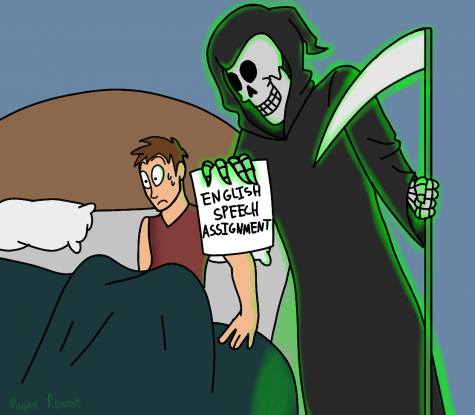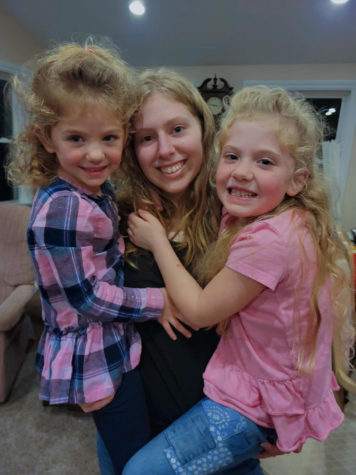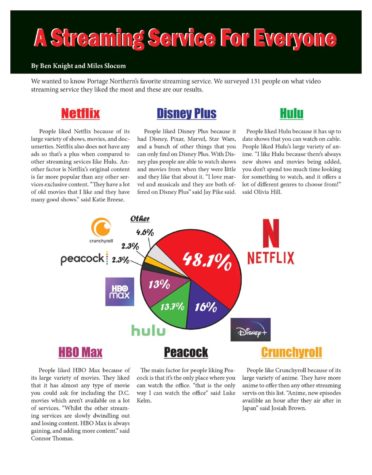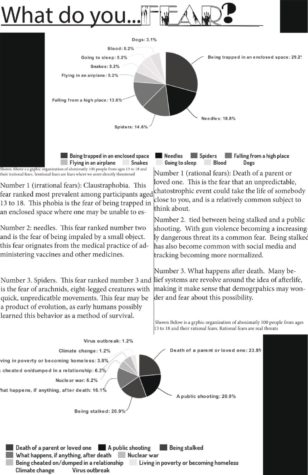Glassophobia: the fear of public speaking
March 12, 2018
Sweaty palms, shaky legs, and one’s throat slowly closing up, these are the much too familiar side effects of public speaking. Public speaking has been the bane of high school students’ existence for as long as anyone can remember.

Speeches and presentations are a main source of student anxiety, but teachers argue that incorporating these assignments is for the best. Lindsey Wangler teaches Honors 10th grade English, where there are 6 to 7 individual and group presentations per year. “It doesn’t matter what job you have, you’re going to need public speaking and interpersonal communications skills,” she said. “Whether you’re going to be a teacher or a manager at GAP, you need the ability to talk to others, especially in a group setting, confidently, clearly, and concisely.”
One issue with public speaking assignments in school is a lack of alternate assignments for students with public speaking anxiety. Sophomore Maggie Johnson says, “Since anxiety will impair public speaking abilities, the low grades from these assignments tend to sink the overall class grade. This adds even more stress to the speaker.” If teachers gave students who requested an alternative assignment something in place of a speech, this could be a possible way to help high school kids cope with their anxiety. Instead of having to stand in front of all their peers just to feel vulnerable and attacked, teachers could give students a chance to do their presentation with just the teacher or maybe have the class put their heads down and just listen to the speech.
According to the National Institute of Mental Health, about 8 percent of the teens in the US population suffer from anxiety and that number has been on a rise since the 1950s. In fact, the Anxiety and Depression Association of America says that this is the most common psychiatric disease that is affecting the US population right now. Sophomore Nina Lockwood, who has experience dealing with her own anxiety, says, “It needs to be made a priority to try and slow down the increasing rates of anxiety, and make sure people who have it get help.” Around 44 million people suffer from anxiety, but only a third of the affected population gets treatment for this serious mental illness. Public speaking opportunities in school could contribute to increasing amounts of teens experiencing this debilitating illness.
Some of the main strategies for coping with anxiety include being able to relax, not perseverate on what you’re nervous about, get lots of sleep. This may sound easy, but for a high schooler with the pressure of grades and a pile of homework waiting to be done, it seems near impossible. As far as public speaking goes, Honors 10 English teacher Aimee Wendland has this advice: “I like to recommend the 7-4-7 breathing technique. You inhale for 7 seconds, hold it for 4 seconds, and exhale for 7 seconds. This allows you to calm your nervous system down and can help you feel more in control of your nervousness.”


















Kylie Clifton • Mar 19, 2018 at 12:22 pm
Your intro is extremely powerful, for a person that is confident with their public speaking I find the in-depth look into an opposing fear then mine to be immensely interesting. I love seeing your work progress Snigda
Liam Fagan • Mar 13, 2018 at 12:00 pm
This is great. Good use of quotes. I’ll definitely give that breathing technique a try.
Laura Koscinski • Mar 13, 2018 at 11:56 am
I love your intro. It really grabbed my attention. You did a great job of explaining glassophobia and getting students and teachers opinions on it!
Brianna Neuhouser • Mar 13, 2018 at 11:52 am
This is a severe phobia that I’ve suffered through and battled for years. Thank you for bringing it to light